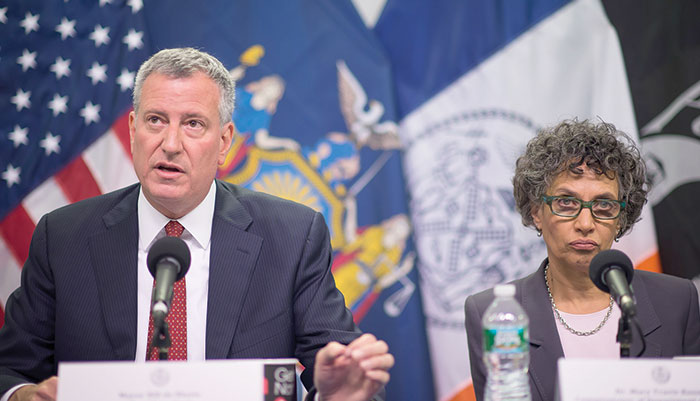Photo Courtesy of Rob Bennett/Mayoral Photography Office
New Yorkers who struggle with mental health and substance use issues end up in our criminal justice system, when the best path is to connect them to treatment,” said City Health Commissioner Mary Bassett, M.D. (r.)
By Forum Staff
The City will invest approximately $90 million in two new “diversion centers” that will open next year and offer short-term stabilizing services for individuals with mental health and substance use needs, providing police officers the option to bring these individuals to a diversion center as an alternative to arrest, Mayor Bill de Blasio announced on Friday.
According to the administration, the facilities will be able to divert approximately 2,400 people annually who would otherwise be arrested on low-level charges.
“These two new diversion centers will provide police officers with a new option for responding to the needs of some of our most vulnerable New Yorkers – instead of making an arrest, police will be able to connect people to the mental health or substance abuse care they need,” de Blasio said. “Safe alternatives to arrest that give people the tools they need to get back on track are key to our criminal justice reforms and bringing down our jail population.”
According to de Blasio, the centers will offer a range of clinical and non-clinical services, including overnight shelter and basic need services, such as food, laundry and showers. Clinical services will include health and behavioral health assessments, counseling, advocacy, peer-to-peer engagement services, medication, medically supervised substance use stabilization and withdrawal management services, and naloxone training and distribution.
The centers will operate 24 hours a day, seven days a week with a no-refusal policy for individuals brought in by the police. Length of stay will vary from hours to days depending on the person’s needs, with a cap of five days, the City said. When there is clinical need, such as more supervision of withdrawal services, the stay can be extended to ten days. Once the client is stabilized, the centers will connect them to healthcare, social services and other supports. The centers will not be used as a replacement for permanent housing or long-term shelter for homeless individuals.
According to the mayor, the City will award approximately $90 million to two non-profit vendors, Project Renewal and Samaritan Daytop Village, to operate the diversion centers for the next 10 years. The contracts will be overseen by the City Health Department. The contracts will begin in June and September. The initiative includes funding and programmatic support from the State Office of Alcoholism and Substance Abuse Services and the State Office of Mental Health.
“Too often, New Yorkers who struggle with mental health and substance use issues end up in our criminal justice system, when the best path is to connect them to treatment,” said City Health Commissioner Mary Bassett, M.D. “Opening Diversion Centers builds on the City’s commitment to expand mental health services for all residents. I commend Mayor de Blasio for taking a public health approach to reform the criminal justice system.”
The two centers are expected to open in early and late 2018, respectively. The facilities will be located in two areas with need and a high concentration of police officers who have been trained in how to deescalate interactions with individuals with behavioral health needs. Specific locations will be announced later this year.

